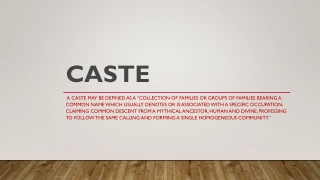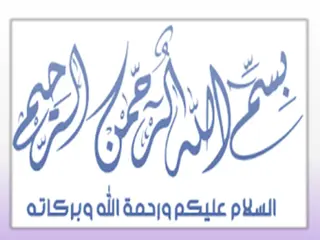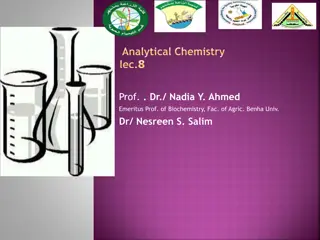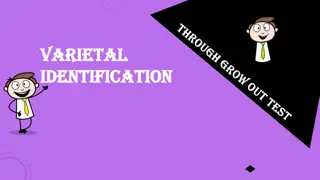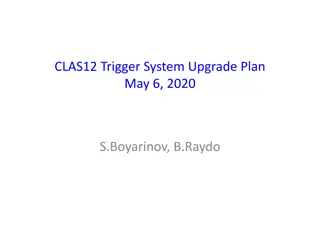Overview of Caste System in India
The caste system in India is a social structure defined by hereditary groups, each with specific occupations, rules, and traditions. Membership is based on birth, leading to a rigid hierarchy and limited mobility between castes. Endogamy, occupation, commensality, and purity are key features that sh
0 views • 17 slides
Actions Emanating from the Evaluation of the Governance Reform
The evaluation of the governance reform within the WMO aimed to assess its alignment with strategic objectives, effectiveness in responding to societal needs, coordination efficiency, decision-making process, agility, and more. Evaluation criteria included relevance, design validity, effectiveness,
1 views • 13 slides
Aspirin Assay by Direct Acid-Base Titration Experiment Overview
Exploring the process of assessing aspirin purity through direct acid-base titration using sodium hydroxide as a standard solution. The experiment includes details on aspirin properties, dosage, acidity, decomposition, and metabolism. Key aspects covered include the aim of the experiment, the princi
5 views • 15 slides
Summary of Standards in Medical Technology and In Vitro Diagnostics 2023 by SIS
The Swedish Institute for Standards, SIS, focuses on purity technology, anesthesia and respiratory equipment, and medical consumables within healthcare. SIS/TK.108 addresses purity requirements for sensitive product manufacturing, while SIS/TK.329 revises safety standards for medical gas installatio
3 views • 19 slides
Understanding Purity in Chemistry Through Formulations and Chromatography
Discover the concept of purity in chemistry by learning how to differentiate between pure substances and mixtures, exploring formulations in product design, and understanding chromatography techniques to analyze chemical composition.
9 views • 40 slides
Comprehensive School Quality Assurance and Evaluation Process
A detailed insight into the Quality Assurance Department's role in school evaluation and improvement processes, including Whole School Evaluation (WSE), Follow-through initiatives, Teaching and Learning assessments, Resumption and Examination Monitoring. The process involves both internal self-evalu
0 views • 20 slides
Methods of Training Evaluation: Overview and Importance
Training and development are fast-growing fields globally, including in India. Evaluation plays a crucial role in understanding the effectiveness and efficiency of training programs for human resource development. This presentation covers the concept of training, evaluation strategies, methods/model
0 views • 61 slides
Universal Evaluation Framework: Simplifying Evaluation Processes
This session introduces the Universal Evaluation Framework (UEF) developed for evaluating QAA Scotland Enhancement Themes. Participants learn key evaluation questions, evidence capture, and the Theory of Change to enhance evaluation confidence. The QAA Scotland Evaluation Odyssey details historical
2 views • 14 slides
Implementing Blind Evaluation Pilot in HORIZON EUROPE: Key Facts and Process
HORIZON EUROPE is conducting a pilot on Blind Evaluation in the 2023-2024 work program to address biases in the research and innovation evaluation process. The pilot aims to assess the feasibility of blind evaluations in ensuring fairness and mitigating potential biases towards well-known organizati
9 views • 9 slides
Strengthening National Evaluation Capacity in the Era of Sustainable Development Goals
The presentation by Vijayalakshmi Vadivelu at the National Evaluation Capacities Conference 2017 in Istanbul focused on the importance of strengthening national evaluation capacity in alignment with the Sustainable Development Goals (SDGs). The content covers the holistic approach to national evalua
3 views • 18 slides
Exploring Developmental Evaluation for Better Decision-Making
Delve into the realm of developmental evaluation, focusing on its purpose, principles, and application in practice. Understand how developmental evaluation emphasizes real-time data collection for informed decision-making in complex systems. Learn about key principles such as developmental purpose,
0 views • 25 slides
Nazi Policies Towards Women: A Critical Analysis
Nazi policies towards women aimed to control and manipulate their roles in society, focusing on reducing women in the workforce, promoting Aryan reproduction, emphasizing purity and health, and encouraging Aryan marriage. These policies restricted women's freedoms and autonomy, enforcing strict guid
0 views • 11 slides
Genetic Purity Testing Methods in Agriculture
Genetic purity testing is crucial in agriculture to ensure the trueness of plant varieties and prevent contamination. Various tests such as the phenol color test for wheat, rice, and sorghum, KOH bleach test for sorghum, and peroxidase activity test for soybean are used to assess genetic purity accu
1 views • 14 slides
Evaluation Practices in Macedonia: What Works, What Doesn't
The comparison between the effectiveness of evaluation practices and the presence of formal institutions in Macedonia raises questions about the impact of institutional design on outcomes. While some countries with robust evaluation institutions fall short in practice, others lacking such structures
1 views • 7 slides
Copper Silicide Market May Set a New Growth Story
Global Copper Silicide Market Breakdown by Application (Laboratory, Chemical Industry, Electronics Industrial Application, Others) by Type (Purity 99%, Purity 99.9%, Purity 99.99%, Purity 99.999%, Others) and by Geography (North America, South Americ
0 views • 8 slides
Enhancing Evaluation Capabilities in Mongolia for Agenda 2030
The Mongolian Evaluation Network in collaboration with UNDP is working to integrate the 2030 Agenda into national strategies and plans, establish institutional coordination mechanisms, align budgets, and enhance data monitoring systems. Key stakeholders including government agencies, NGOs, and inter
0 views • 9 slides
Back Titration in Analytical Chemistry
Back titration is a technique used in analytical chemistry to determine the concentration of an analyte by reacting it with an excess of another reagent first, followed by titration of the excess reactant. This method is especially useful in cases where direct titration endpoints are difficult to di
2 views • 14 slides
Understanding Demi-Regularity in Realist Evaluation
Realist Evaluation is a theory-driven approach focusing on understanding the context and mechanisms of action behind policies and interventions. This webinar explores the concept of demi-regularity in realist evaluation, its origins, and its application in analyzing complex evidence. Key aspects cov
1 views • 16 slides
Understanding Evaluation in Education
Evaluation in education is a comprehensive term that encompasses measurement, testing, and qualitative examination of student behavior. It involves both quantitative and qualitative descriptions, along with value judgments. Differentiating from mere measurement, evaluation provides a deeper analysis
0 views • 28 slides
Understanding Grow-Out Test for Genetic Purity Evaluation in Seed Certification
The Grow-Out Test is a crucial measure in seed certification to determine the genetic purity of seed lots. It helps in controlling genetic contaminations and ensuring compliance with prescribed standards. This test is essential for certain species like cotton, castor, musk melon, and brinjal in Indi
0 views • 16 slides
Sustainable Evaluation Systems Workshop Summary
Workshop on Sustainable Evaluation Systems by Stephen Porter at the NEC Conference focused on defining evaluation systems, addressing their failures, and emphasizing the importance of quality, use, and networks in achieving sustainability. Participants engaged in activities such as bingo card introd
0 views • 38 slides
Strategic Management: Strategy Review and Evaluation
This chapter delves into the critical process of strategy review, evaluation, and control in strategic management. It covers the nature of strategy evaluation, effective evaluation systems, contingency planning, auditing, using computers for evaluation, and guidelines for effective strategic managem
1 views • 42 slides
Understanding Evaluation and Ideology in Translation
Evaluation plays a crucial role in the study of translation, influencing both meaning and value in communication. This evaluation is reflected through language elements like accentuation, deletion, and substitution. Appraisal, stance, and evaluation are key terms in linguistic analysis that focus on
2 views • 22 slides
Impact and Evaluation Toolkit for Churches and Christian Charities
This toolkit aims to equip churches and Christian charities engaged in small-scale social action projects to think about impact, measure impact, choose data tools, reflect on evaluation data, and use it effectively. It covers principles of evaluation, setting objectives, selecting indicators, storyt
0 views • 34 slides
Evaluation Metrics for IEEE 802.11-14/0107 HEW Proposal
Evaluation metrics play a crucial role in assessing WLAN system performance and achieving the objectives of High Efficiency WLAN (HEW). This proposal by Yonggang Fang et al. from ZTE outlines the key evaluation metrics recommended for evaluating HEW performance, including area throughput, average th
0 views • 12 slides
Overview of Monitoring and Evaluation in the GEF
The Evaluation in the GEF and Training Module focuses on promoting accountability and learning within the Global Environment Facility (GEF) through monitoring and evaluation activities. The GEF Independent Evaluation Office plays a crucial role in assessing results, effectiveness, and performance of
0 views • 25 slides
Chile Country Portfolio Evaluation 2010-2014 Summary
Evaluation process of Chile's country portfolio from 2010-2014 included pre-evaluation, during evaluation, and results/conclusions phases. Challenges like defining scope and participant concerns were addressed. Preliminary conclusions were presented to stakeholders, leading to a trustful and represe
1 views • 6 slides
Importance of Wudhu (Ablution) in Islam
Wudhu, or ablution, holds a significant place in Islam as it is a prerequisite for prayer. The Prophet Muhammad (saw) and Imams emphasized the importance of purity in prayer, highlighting the spiritual and practical benefits of performing wudhu. Through verses from the Quran and teachings of the Ima
0 views • 18 slides
Potential Amendments for Reforming REACH Evaluation Process
Discussion at the Ad-hoc Meeting of Competent Authorities for REACH and CLP focused on potential options for amending the REACH Regulation to reform the evaluation process. Topics included registration-related measures, substance evaluation, testing proposals, compliance checks, and expectations dur
0 views • 30 slides
Reflections on Love, Faith, and Purity Through Scriptures
Reflect on the themes of love, faith, and purity through various scriptures from the Bible. Explore verses on the importance of keeping one's first love, seeking God's word with all your heart, and loving the Lord with all your being. Discover how to maintain purity by aligning with divine teachings
0 views • 7 slides
CLAS12 Trigger System Upgrade Plan May 6, 2020
CLAS12 Trigger System is undergoing an upgrade to enhance trigger efficiency, purity, and data rate reduction. The existing hardware and trigger overview provide insight into the current system's components and operation. The upgrade goals aim to maintain high trigger efficiency, reduce data rates,
0 views • 14 slides
Developing an Evaluation Work Plan for Effective Program Assessment
This presentation by Amy D. Andrade from San Jose State University focuses on developing an Evaluation Work Plan to identify responsibilities and timelines. It covers topics such as Evaluation Coaching Support, Webinar Outlines, Logic Model, Inputs-Outputs-Outcomes, Two Approaches to Evaluation, Pro
0 views • 29 slides
Evaluation Synthesis in Changing Contexts: Enhancing Knowledge for Development Effectiveness
Evaluation synthesis is crucial for promoting learning, reflection, and decision-making in development work. This process involves bringing together diverse knowledge sources to generate strategic insights and facilitate wider use of evaluation findings. The Independent Office of Evaluation of IFAD
0 views • 20 slides
Evaluation of FME Zero Emission Neighbourhoods in Smart Cities
The mid-term evaluation process of FME Zero Emission Neighbourhoods in Smart Cities involves self-evaluation, partner evaluation, and panel evaluation. The procedure includes scientific review, evaluation by scholars, and innovation assessment. Key documents like self-reports, progress reports, and
1 views • 20 slides
Overview of Regular Evaluation 2017 Findings in Estonia
In the Regular Evaluation 2017, efforts were made to maximize the benefits of evaluation outcomes for various stakeholders in Estonia such as the state, society, and institutions. The evaluation focused on a range of actions including preparing legislation, finding experts, creating self-report form
0 views • 6 slides
Comprehensive Guide to Training Evaluation Methods
This detailed guide covers the aim of evaluation, evaluation methods, techniques of evaluation, types of evaluation (formative, process, outcome, impact), and the significance of formative and process evaluation in assessing training effectiveness. Learn about the key principles and practices involv
0 views • 45 slides
Innovative Salt Extraction Methods and Quality Assessment Report
The report focuses on proposing alternative methods for salt extraction from natural sources, evaluating productivity and purity. Strengths include detailed purification methods, while weaknesses involve inadequate purity testing and time management issues. The discussion highlights key areas for im
1 views • 5 slides
Understanding Sterile Pharmaceutical Products Development
Sterile products are dosage forms free of viable microorganisms, crucial for parenteral administrations to ensure therapeutic efficacy and patient safety. This article covers the importance of sterile products in the pharmaceutical industry, the development objectives, different routes of administra
0 views • 31 slides
The Value of Righteousness - Holiness, Purity, and the Mystery of Redemption
Exploring the significance of righteousness through scriptures and reflections on holiness, purity, and the mystery of redemption. The content delves into the everlasting nature of righteousness, the connection between humility and holiness, and the divine presence of God. It emphasizes the internal
0 views • 52 slides
Exploring High-Purity Niobium: Industrialization, Alternative Production Methods, and Strategic Collaboration
Delve into the realm of high-purity niobium with a focus on industrialization, alternative production techniques, and strategic partnerships. Discover insights on quality assurance, stable production, and planning reliability for Nb RRR products. Learn about Heraeus and Plansee, key players in the i
0 views • 17 slides
